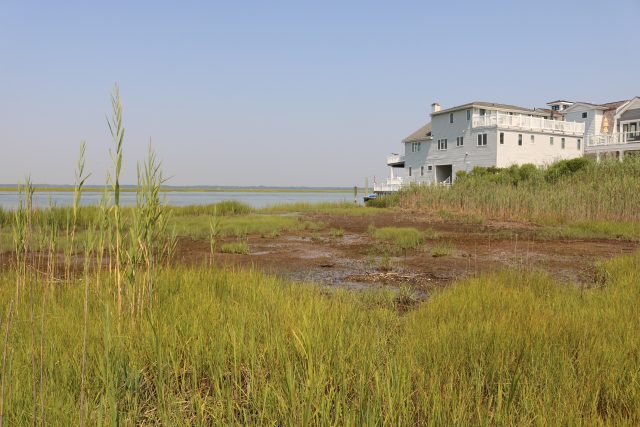By DONALD WITTKOWSKI
With the price of shore property skyrocketing during the pandemic, Sea Isle City appears to have gotten a bargain by buying two bayfront lots for $300,000.
The city is kicking in $250,000 and a group of homeowners will contribute $50,000 to acquire the land at the bay end of 81st Street from the members of a family that had owned the property since the 1950s. The family members originally had sought $875,000 from the city, Sea Isle’s solicitor said.
In a 5-0 vote Tuesday, City Council approved a settlement agreement that gives Sea Isle ownership of the land and also ends a two-year legal battle that began when the former owners filed a lawsuit in an unsuccessful attempt to build a vacation home on the property.
Family members Shirley A. Kling and Terrance L. Crowley sued the city after Sea Isle’s zoning board rejected their application in 2019 to build the home because part of the property is located within a wetlands conservation zone protected from development.
Under Sea Isle’s zoning laws, areas that are designated for wetlands conservation are restricted to “recreational fishing and crabbing, boating, passive recreation and environmental study.” Home construction is not allowed in those areas.
As the new owner of the bayfront property, Sea Isle plans to keep it as open space that will remain in its natural state, City Solicitor Paul Baldini said.
“We’re going to preserve it into the future,” Baldini explained in comments during the Council meeting.
After the meeting, Baldini said in an interview that the site will now become public land.
“If someone wants to go up there and watch the sunset, we’re not going to stop them,” he said of the public using the land.
Gaining access to it, though, could pose a challenge for anyone. Tucked behind tall marsh reeds at the end of 81st Street, the property is essentially muddy wetlands overlooking the back bays.

Kling and Crowley, whose families had owned the property since 1957, wanted to use part of the site to build a vacation home. They had argued that their project “satisfied all criteria” for a zoning variance and would not have a negative impact on wetlands, flooding, threatened or endangered wildlife or other environmental concerns.
However, the zoning board refused to grant the variance during a meeting in 2019 after expressing concerns about flooding in the neighborhood. Board members also said they did not want to set a precedent by allowing a new home to be built in a wetlands conservation area. The courts later upheld the zoning board’s denial of the variance.
During the zoning board meeting, opponents who live in the surrounding neighborhood testified against the proposed home. They expressed fear that the project would harm the environment and exacerbate flooding in the neighborhood.
A group of five neighboring homeowners later joined with Sea Isle for the funding package to buy the property from Kling and Crowley. Baldini said Kling and Crowley originally had sought a buyout of $875,000, but settled for $300,000. An attorney representing Kling and Crowley could not be reached for comment Tuesday.
Property values in Sea Isle – along with the rest of the Jersey Shore – have been surging since the pandemic.
Reflecting a boom in the real estate market fueled by low mortgage rates, a surging stock market and the shore being seen as a safe haven from the COVID-19 pandemic, Sea Isle has now become a million-dollar housing market.
The median sale price for homes in Sea Isle has now jumped above $1 million and shows no signs of slowing down over the summer because demand is high and inventory is low, real estate agents said.
In addition to naming the zoning board in their suit, Kling and Crowley also sued the city of Sea Isle. That part of the litigation focused on an issue known as “inverse condemnation.” It is a legal term to describe when government takes private property but fails to pay the required “just compensation” for the land.
However, the settlement also ends the inverse condemnation claim, Baldini said.
In other business at the meeting, Council approved a resolution to accept a federal grant of $122,280 to purchase body cameras for Sea Isle’s police officers. The federal grant is administered by the New Jersey Department of Law.
In recent years, Sea Isle has been increasing the number of body cameras worn by its police officers and upgrading to the latest technology. New body cameras offer higher quality video, better nighttime capability and improved software.
The body cameras allow officers to video the action when they are out on patrol. They are growing in use among police departments nationwide as a way to protect both the officers and the public.








